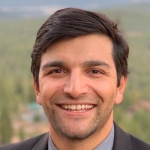ci2: Advances in Artificial Intelligence and Novel Imaging Methods Conference Showcasing Hyperpolarized C-13, Midfield, and Information Commons
Date
The Center for Intelligent Imaging (ci2) invites you to
Advances in Artificial Intelligence and Novel Imaging Methods Conference
Showcasing Hyperpolarized C-13, Midfield, and Information Commons
RSVP here: http://bit.ly/3Rt0Gzf
When: October 3 - 5, 2023
University of California San Francisco (UCSF)
- Department of Radiology and Biomedical Imaging
- Center for Intelligent Imaging (ci2)
- Hyperpolarized MRI Technology Resource Center (HMTRC)
- Bakar Computational Health Sciences Institute (BCHSI)
Universitätsklinikum Schleswig-Holstein (UKSH) Campus Kiel
- Intelligent Imaging Lab, Section Biomedical Imaging
- Hyperpolarization Group, Section Biomedical Imaging
German Center for Research and Innovation (DWIH)
Type
Time Duration
Location
Video Conference To
The Center for Intelligent Imaging (ci2) invites you to
Advances in Artificial Intelligence and Novel Imaging Methods Conference
Showcasing Hyperpolarized C-13, Midfield, and Information Commons
RSVP here: http://bit.ly/3Rt0Gzf
When: October 3 - 5, 2023
University of California San Francisco (UCSF)
- Department of Radiology and Biomedical Imaging
- Center for Intelligent Imaging (ci2)
- Hyperpolarized MRI Technology Resource Center (HMTRC)
- Bakar Computational Health Sciences Institute (BCHSI)
Universitätsklinikum Schleswig-Holstein (UKSH) Campus Kiel
- Intelligent Imaging Lab, Section Biomedical Imaging
- Hyperpolarization Group, Section Biomedical Imaging
German Center for Research and Innovation (DWIH)
Speakers


Keynote Speaker
Dr. Rusu is currently an Assistant Professor, in the Department of Radiology at Stanford University, where she leads the Personalized Integrative Medicine Laboratory (PIMed). The PIMed Laboratory has a multi-disciplinary direction and focuses on developing analytic methods for biomedical data integration, with a particular interest in radiology-pathology fusion to facilitate radiology image labeling. The radiology-pathology fusion allows the creation of detailed spatial labels, that later on can be used as input for advanced machine learning, such as deep learning. The recent focus of the lab has been on applying deep learning methods to detect and differentiate aggressive from indolent prostate cancers on MRI using the pathology information (both labels and the image content), work that was recently published in Medical Physics and Medical Image Analysis Journals.

Keynote Speaker
Dr. Chaudhari is an Assistant Professor in the Integrative Biomedical Imaging Informatics at Stanford (IBIIS) section in the Department of Radiology and (by courtesy) in the Department of Biomedical Data Science. He leads the Machine Intelligence in Medical Imaging research group at Stanford and has a primary research interest that lies at the intersection of artificial intelligence and medical imaging. His group develops new techniques for accelerated MRI acquisition and downstream image analysis, extracting prognostic insights from already-acquired CT imaging, and developing new multi-modal deep learning algorithms for healthcare that leverage computer vision, natural language, and medical records. Dr. Chaudhari has won the W.S. Moore Young Investigator Award and the Junior Fellow Award from the International Society for Magnetic Resonance in Medicine. Dr. Chaudhari has also been inducted into the Academy of Radiology’s Council of Early Career Investigators in Imaging program. He also serves as the Associate Director of Research and Education at the Stanford AIMI Center and is an advisory board member of the Precision Health and Integrated Diagnostics Center.
